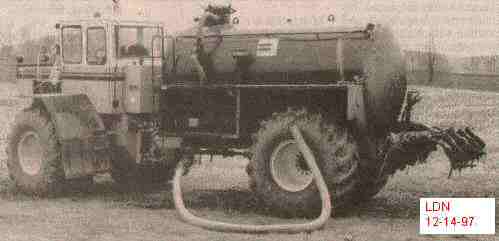
Sludge issues, Lebanon
County, PA
Following is one of a series of four articles dealing with sludge
issues
published in the Lebanon Daily News of December 14, 1997
"Lebanon plant a local sludge supplier for 17 years"
by Terry McPhillips
NORTH CORNWALL -- The two huge cylindrical tanks at the City of
Lebanon Waste Water Treatment Plant hold up to 3.2 million gallons of some
of the most unpleasant waste one would care to imagine.
A network of pipes runs between the two tanks in a central
maintenance area, one leading to a faucet and basin. James B. Fraytic,
plant superintendent, turns the faucet on a recent morning and a black
smelly goo pours out.
"It's a little runnier than normal," Fraytic says, examining the
mixture closely. Part of his job is monitoring the sludge to see if it
contains unexpected materials.
Thanks to hungry microbial bacteria, whatever humans put down the
drain -- including the occasional goldfish, clumps of hair and toe nail
clippings -- is turned into a thick, oozing black sludge. Much of the
water is separated, chemically cleaned, and pi ped to the nearby
Quittapahilla Creek.
Some treatment plants opt to get rid of sludge via an expensive
drying and landfilling process. At Lebanon, sludge undergoes a name
change, to biosolids, and becomes a fertilizer filled with the nitrogen
and phosphates crops need. It also contains chemic als and heavy metals
that opponents of biosolids say are dangerous.
The sludge is pumped out of holding tanks where it has stewed for
at least 40 days, and into larger tanker trucks that transport it to
farms. There, it is loaded into a sludge spreader and injected into the
soil. Farms can use up to 10,000 gallons per ac re, depending on the drop.
"What do you smell?" Fraytic asks a guest just after a sludge
application on a 70-acre farm in South Lebanon Township. The answer:
nothing. "If it's well-digested and its properly done, then it shouldn't
smell at all."
Opponents of sludge application say smell is part of the problem.
Fraytic, though, says it's important not to confuse sludge with liquefied
manure, a black sludge-like fertilizer that produces a pungent odor.
Lebanon's sewage treatment plant has been providing sludge to
local farms for free since 1980 and currently serves 10 farms, in North
and South Annville townships and North and South Lebanon townships.
Under the direction of Cora Shenk, assistant superintendent at the
plant, and Thomas Demler, a biosolids removal specialist, employees
transport and spread the sludge for several weeks in the spring and the
fall.

Shenk and Demlerdo all the core testing, state permitting and
paperwork involved with getting the sludge to the farmer and spreading it.
Follow up assessments are performed after each application.
The primary danger comes, Fraytic said, when farmers don't pay
attention to the nutrient content already provided by the sludge and
continue to fertilize, damaging the crops and raising the level of
nutrients and heavy metals to render the soil useless.
"While I'm a big supporter of this, I'd be the first to admit
there is a big down potential that has to be monitored," Fraytic said of
the possibility to abuse the process. "We have a valuable resource that we
can provide as long as people are willing to
accept the rules and regulations that are in place."
Fraytic said only one farmer has turned down the offer for free
sludge because of its perceived negative impacts since he's been
administering the program.
"It is the end result of our operation here and we need to get rid
of what we can," Fraytic said.
Fraytic said he and the treatment plant staff are willing to show
their operation and records to anyone interested in learning more about
using sludges as a biosolid fertilizer. (Readers can call the plant at
272-2841.)
"I'm sure that we can address all their hopes and fears and once
people see for themselves how the operation works and they can inspect
what we do here, they'll say, at least 'Let's try it,'" he said.
first version: April 4, 1998; reorganized: January 7,15 1999 ...BLO
file name= https://members.tripod.com/~PA_Sludge/html/Leb_sluda.html;
to go to:
PA Sludge Index Page
or
General Sludge Index Page


